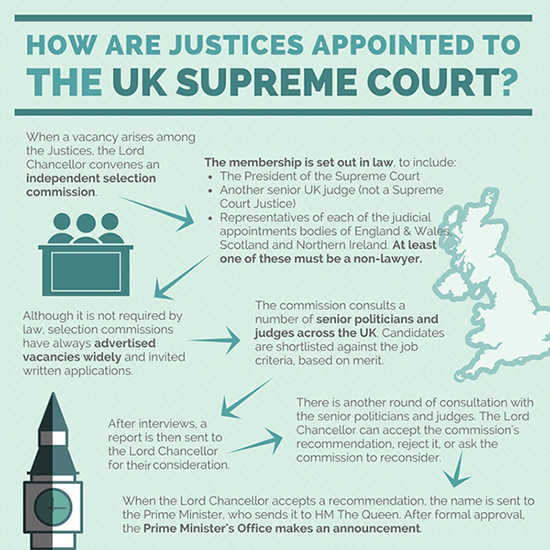Judicial vacancies
Justice of the Supreme Court of the United Kingdom
Applications are sought for the appointment of a new Justice of the Supreme Court. The appointment is expected to take effect in the spring of 2021.
The UK Supreme Court and Judicial Committee of the Privy Council hear a wide range of very complex and high profile legal appeals, which can have considerable impact across the United Kingdom and beyond. The withdrawal of the UK from the EU makes this a particularly important time at which to be appointed a Justice.
All those appointed to the Court need to be people of truly exceptional intellectual and legal ability, with sound judgment and decisiveness. The selection commission is looking for candidates who can show an ability to contribute to the collegiate decision-making of the Court, a sensitivity to the needs of different communities and groups and an ability and willingness to engage in the wider representational and leadership role of a Justice, together with an appreciation of the developing nature of the constitution and law in England, Scotland, Northern Ireland and Wales. The Supreme Court is required by statute to have judges with a knowledge of, and experience of practice in, the law of each part of the United Kingdom.
The vacancy arises from the retirement of Lady Black of Derwent on 10 January 2021.
The selection commission welcomes applications from the widest range of applicants eligible to apply, including those who are not currently full-time judges, and particularly encourages applications from those who would increase the diversity of the Court.
The closing date for applications is midday on 20 November 2020.
Please contact Grainne Hawkins (grainne.hawkins@supremecourt.uk tel: 020 7960 1906) for an application form.
Support and further information for prospective candidates
An opportunity for potential candidates to speak to a Justice about working at the court can be arranged. More information is available via the following link: Familiarisation conversations for potential judicial candidates
Listen
We have produced a short series of podcasts, featuring interviews with serving Justices. In these, Justices speak about their career path and why they applied to become a Justice, as well as sharing insights into what the application process felt like and what advice they would give someone considering applying.
Watch
In this short video the President of the Supreme Court, Lord Reed, announces the launch of the recruitment campaign and provides some information about the role of a Supreme Court Justice and details about the application process.
A text copy of Lord Reed's words in the video is available here.
Key documents
Further information which may be of interest to applicants
- Equal Merit Provision Policy (PDF)
- UKSC Annual Report and Accounts 2019/20
- UKSC Business Plan for 2020-2021 (PDF)
The independent selection process

Much of the selection process is set out in statute, namely the Constitutional Reform Act 2005 (as amended by the Crime and Courts Act 2013).
In short, the steps undertaken by the independent selection commissions (once convened by the Lord Chancellor) are:
- Consultation with the Lord Chancellor on the position to be advertised and the process of selection
- The vacancy is advertised, with candidates invited to submit a personal statement, examples of work and details of independent assessors. The basic eligibility criteria are set by Parliament.
- The statute also requires that the Lord Chancellor, the First Minister of Scotland, the First Minister of Wales, the Judicial Appointments Commission in Northern Ireland and senior judges across the UK are consulted as part of the selection process.
- Candidates are shortlisted and interviewed by the panel. Under changes introduced by the Crime and Courts Act 2013, where two candidates are deemed to be of equal merit, the commission can give preference to one candidate over the other for the purpose of increasing diversity within the Court.
- After interviews, a report is sent to the Lord Chancellor for his consideration. There is another round of consultation with the senior politicians and judges. The Lord Chancellor then accepts the recommendation(s), or can reject it, or ask the commission to reconsider.
- When the Lord Chancellor accepts a recommendation, the name is notified to the Prime Minister and HM The Queen. The candidate is informed of the outcome, and the Prime Minister's Office then makes an announcement.
A more detailed description of the process is also available on our Appointments of Justices section.